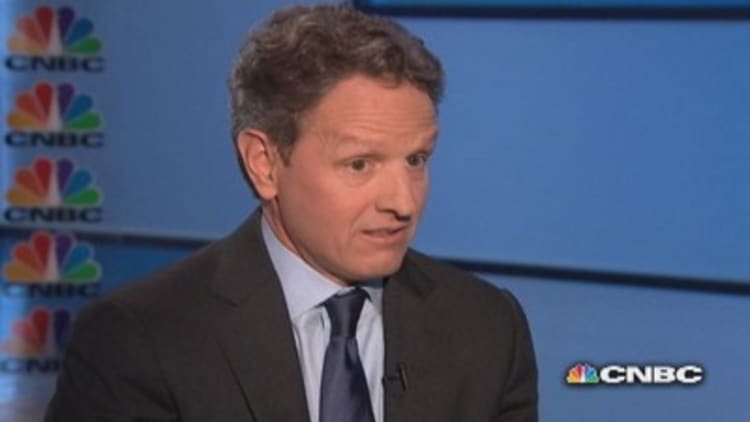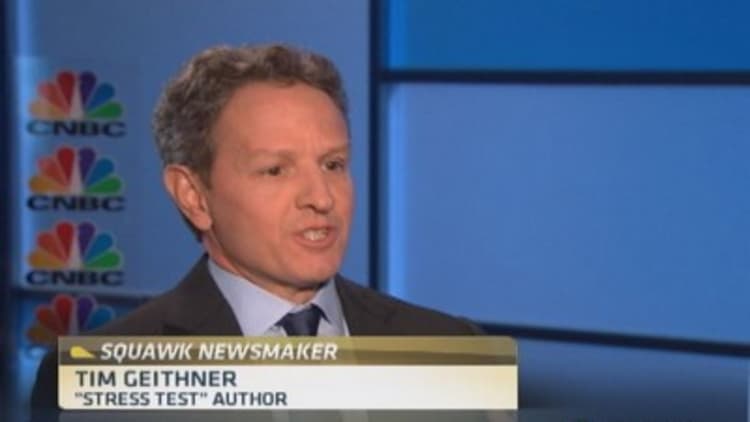
The U.S. should make it harder for companies to reap tax benefits from merging with foreign corporations, former Treasury Secretary Tim Geithner said in a wide-ranging interview on CNBC that aired Monday.
The recent debate over these tax-driven deals kicked into high gear with Pfizer's $106 billion offer to buy its British rival AstraZeneca. If completed, the American drug company could save billions of dollars by relocating to the U.K., where business taxes are lower.
Geithner said in the interview on "Squawk Box" the foreign merger situation showed the need for the Obama administration's 2012 corporate tax reform plan, which failed to win support. "It was to address, partly, this risk [and] to try to create a system where there's better incentives for investment."
Under the plan unveiled in February 2012, the White House proposed eliminating tax loopholes and lowering the corporate tax rate from 35 percent to 28 percent. It had also sought to reduce provisions that allow companies to shift income and investment outside the U.S. while giving tax credits to American companies to bring operations back.
"In the absence of comprehensive reform, you can still do things to make it harder to do these types of transactions," Geithner said in the CNBC interview. "We should be doing that."
One of those measures was tucked into the president's 2015 budget. It would stop so-called inversions—the practice of legally allowing U.S. companies to reincorporate in another country by purchasing a smaller foreign firm.
But with the division in Congress, that's not likely to pass.
The interview was conducted as Geithner's new book "Stress Test" on the 2008 financial crisis was released.
Over the weekend, Glenn Hubbard, top economic adviser to Mitt Romney's presidential campaign, told Politico that Geithner lied in his book about a private discussion on taxes during the 2012 presidential race. Geithner wrote that Hubbard supported increases.
In a statement to CNBC, Hubbard clarified the context surrounding the Politco report:
Yesterday, a reporter asked me about the veracity of a claim in former Treasury Secretary Timothy Geithner's new book "Stress Test" that I confided with him before the 2012 election that the Romney team, if elected, would raise taxes. I have not read Geithner's book, so I do not know the context of his story. The statement, though, is simply not true. Neither Mr. Geithner nor his publisher reached out to check the veracity of the statement before publication.
In response, a Geithner representative said: "Mr. Geithner's memory on this exchange is crystal clear. He stands by his account in 'Stress Test.'"
Challenges ahead
Geithner had remained rather low key since leaving the Treasury Department in January 2013, while he worked on his book.
Reflecting on the depths of the Great Recession and where the U.S. stands today, Geithner offered a mixed review.
"The country still has a lot of challenges," he said. "Americans as a whole feel less confident still that they are going to be able to build a better life for their children."
Read More5 takeaways from Geithner and the financial crisis
Consequently, there's been a "tremendous loss of faith" in the ability of the political process to effect change, he said.
But even with those challenges, Geithner continued, "we're a strong country … [and] we're gradually healing from the damage."
Too cozy with bankers?

During the financial crisis, Geithner faced criticism that he was too close to Wall Street, where ironically and surprisingly to many he had never worked.
Looking back, Geithner said, "I didn't think [Wall Street] was a terrifically noble or ethical profession … nor did I think it was a profession that had a disproportionate share of people who are ethically challenged."
But despite bringing that baggage to the table, he believed that shoring up the banks was the best way to keep the U.S. economy from spiraling into a depression.
"The people I worked with [from Wall Street] … were probably the best part of that system," he said. "They were people with pretty good judgment, and I thought total good ethical character."
Welcome to Wall Street
After spending his entire career in public service, Geithner finally did land on Wall Street—saying: "I had to do something new."
Geithner started his new job as president of private equity firm Warburg Pincus last month. He said he was aware of the public criticism of his going from the Treasury to Wall Street.
"I didn't want to go work for a firm that we had regulated or that we had rescued," Geithner stressed, but he said he remained unsure if he's been able to mitigate that negative perception.
—Reporting by CNBC's Andrew Ross Sorkin. Written by CNBC's Matthew J. Belvedere.

